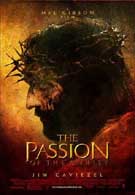When I saw The Passion of the Christ I expected something momentous to happen. After all the buildup, I wouldn’t have been surprised at all to have experienced the rapture. It would have been nice at least to have seen the Four Horsemen of the Apocalypse come riding through the theater after the closing credits. But fact is that The Passion isn’t a life changing experience, nor is it some sort of massive revelation on the life of Jesus (Jim Caviezel). It isn’t likely to inspire another Nazi-like genocide any more than it is likely to generate religious fervor in anyone who doesn’t already have it. It is at its simplest Mel Gibson’s sharply drawn vision of what may have happened. How you react to it depends mostly on what you take in with you.
Evaluated simply as a movie, without all the baggage controversy or religious faith bring with them, director Mel Gibson has created a brutal and unflinching portrayal of ultimate suffering. In fact, he’s so focused on persecution that he neglects to really show any of the things which made Jesus such a magnetic and incredible man to begin with. The film opens on Jesus’ last night, mere moments before he’s betrayed and taken. It ends with his death and subsequent resurrection, but almost every moment in between there is occupied with torture, humiliation, and ultimate suffering. This in and of itself is quite powerful. Gibson does a great job of capturing what Jesus’ sacrifice meant, what he endured, in a way few have even had the courage to consider before. Powerful as that is, I would have liked to have been given more time to become attached to the man that Jesus was, before he became human sacrifice. All we’re handed of his life before that fateful night are a few flashbacks. Flashbacks so brief, they’re almost irrelevant. I question whether Gibson hobbled the emotional impact his film might have had, were he to tell more of Jesus’ story.
Because of that, The Passion is all about what you take in with you. Since the film itself does little to define Jesus as a man beyond the pain, how you view him is shaped by what you think of him before you land in your seat, not by anything the movie throws to you. I suspect that was intentional and perhaps even laudable considering the subject matter. Gibson isn’t out to win converts. His intent seems only to bring to life a brief moment that everyone already knows.
The Passion of the Christ is a visual feast of brutality and cinematic savvy. Gibson does a fantastic job of realistically beating the living daylights out of Jim Caviezel. I can honestly say I’ve never seen anyone on screen endure something like that. By the end, Caviezel’s skin looks like dog food. He’s a disturbing mass of pain and shredded flesh that communicates with the audience only by energy emanating from his one good eye.
What saps at Jim’s fine work, is The Passion’s tendency makes sure you feel every blow inflicted on Caviezel’s Christ, courtesy of extreme overuse of slow motion. Mel, I get how horrible this is, how about we speed it up a little? On his long trek with his cross, Jesus stumbles and falls at least 5 times. Each fall takes about 60 seconds to complete, as Mel slows time down and drags the fall out over and over and over, just to make sure we don’t miss the beads of blood dripping of Caviezel’s face. It’s overkill. The movie could have been a half hour shorter and a lot more gripping if he’d let time run at a more normal rate. I don’t have a problem with slow motion to emphasize something, but there’s a point at which the film is only dragging its feet.
Despite the controversy and the use of dead languages (translated with as few subtitles as possible), The Passion of the Christ is a fairly middle of the road film. If you’re predisposed towards speaking in tongues, The Passion may set you off. If you’re a hardcore atheist, no doubt you’ll find yourself taking a nap. If you’re dead set on finding something anti-Semitic in it, you’ve got your work cut out for you because that just isn’t there. Love or hate what Gibson has done, it’s hard not to respect it.
Note: Writing this review a day after the film’s release, I have the luxury of seeing the public’s initial reaction to the film. Clearing well over 20 million in only one day of release is quite a feat. Actually, it’s pretty incredible when you consider that Gigli was in its own dismal way nearly as controversial and it flopped completely. Combine that with the fact that people hate movies with subtitles and recent declining church attendance and you have to wonder why this thing is doing so well. I think it’s timing. The world is in a tailspin. People are busy overreacting to perceived moral decay. We all saw Janet Jackson’s hideous breast at the Superbowl and now it’s time to repent. A trip to see The Passion is a whole lot easier than spending every Sunday in church.











